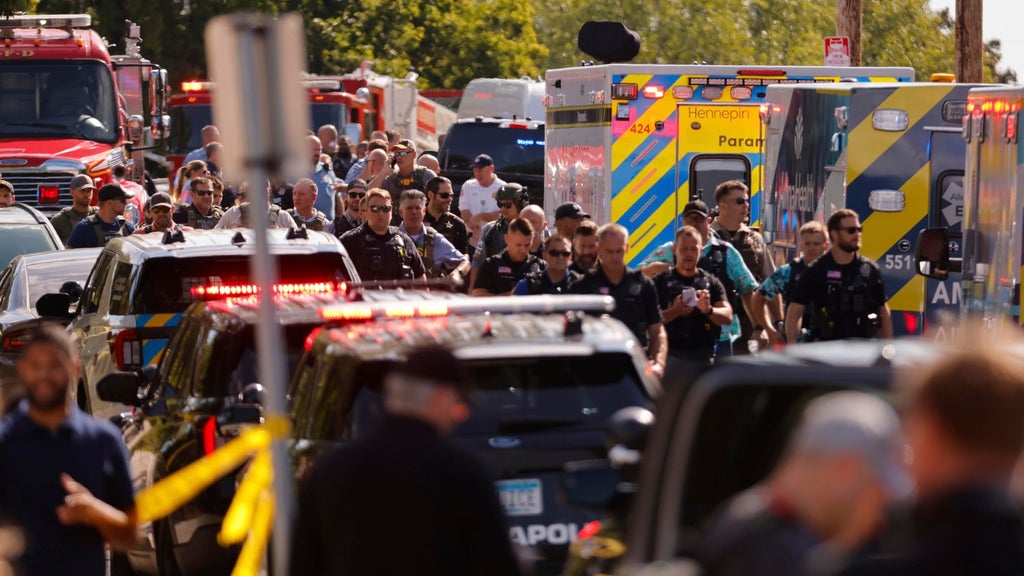Health
Medical Heroes Reflect on Trauma Following Minneapolis Shooting

On March 15, 2024, a mass shooting at the Annunciation Catholic Church in Minneapolis left multiple individuals injured, prompting swift action from medical professionals. As they rushed to provide aid, the experiences they encountered that day have left lasting emotional impacts on many of them.
At Hennepin Healthcare, six of the wounded remain under care. While doctors and nurses work diligently to treat their physical injuries, they are also grappling with the psychological toll of witnessing such violence. The scenes of children fleeing for safety amid gunfire are images that will linger in the minds of those who were present.
Hennepin County EMS Assistant Chief Ryan Mayfield described the necessity of focusing purely on the task at hand. “There’s a part of your brain you have to turn off and just focus on the task and not think about the emotion,” he stated. He expressed pride in the paramedics’ efforts, noting that they transported 14 patients within just 24 minutes of the initial 911 call. Yet, he acknowledged the haunting nature of the event for all responders involved.
The gravity of the situation was echoed by Dr. Aaron Robinson of Hennepin Healthcare, who shared the profound shock experienced on the scene. He emphasized that pushing through the trauma was essential for effectively aiding the wounded and preparing the hospital for the influx of patients.
“We want people to know that the system that day worked well,” said Dr. Matt Prekker, who coordinated patient arrivals at the hospital. He highlighted the importance of collaboration among police, fire services, and EMS, emphasizing that without such coordination, the loss of life could have been significantly greater.
Despite the successful response, the emotional aftermath weighs heavily on the professionals involved. “In this job, you learn to compartmentalize things,” Robinson explained. He noted that while they focus on immediate medical needs, the emotional impact is often addressed later.
As they navigate their feelings, these healthcare workers are relying on support from peers and colleagues. “It’s a different feeling coming into the building each morning since this happened,” Prekker remarked, unsure when a sense of normalcy might return.
The incident has also highlighted a critical need for blood donations in Minnesota, which currently faces a severe shortage, with only a two- to three-day supply available. Medical professionals are calling on the public to contribute by donating blood, reinforcing the idea that anyone can play a role in saving lives.
While the physical wounds may heal over time, the emotional scars from that tragic day will likely remain with these healthcare heroes as they continue to serve their community.
-

 Lifestyle4 months ago
Lifestyle4 months agoLibraries Challenge Rising E-Book Costs Amid Growing Demand
-

 Sports3 months ago
Sports3 months agoTyreek Hill Responds to Tua Tagovailoa’s Comments on Team Dynamics
-

 Sports3 months ago
Sports3 months agoLiverpool Secures Agreement to Sign Young Striker Will Wright
-

 Lifestyle3 months ago
Lifestyle3 months agoSave Your Split Tomatoes: Expert Tips for Gardeners
-

 Lifestyle3 months ago
Lifestyle3 months agoPrincess Beatrice’s Daughter Athena Joins Siblings at London Parade
-

 World3 months ago
World3 months agoWinter Storms Lash New South Wales with Snow, Flood Risks
-

 Science4 months ago
Science4 months agoTrump Administration Moves to Repeal Key Climate Regulation
-

 Science3 months ago
Science3 months agoSan Francisco Hosts Unique Contest to Identify “Performative Males”
-

 Business4 months ago
Business4 months agoSoFi Technologies Shares Slip 2% Following Insider Stock Sale
-

 Science4 months ago
Science4 months agoNew Tool Reveals Link Between Horse Coat Condition and Parasites
-

 Sports4 months ago
Sports4 months agoElon Musk Sculpture Travels From Utah to Yosemite National Park
-

 Science4 months ago
Science4 months agoNew Study Confirms Humans Transported Stonehenge Bluestones









